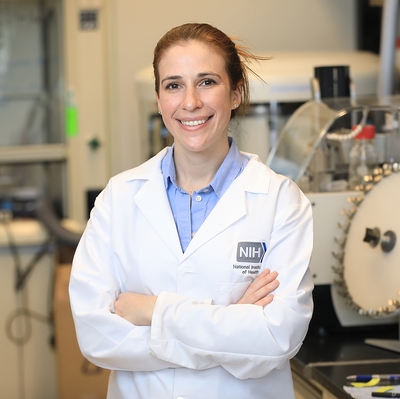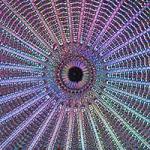
Research Topics
The Section on Immunoengineering develops immune-active biomaterials for regenerative medicine through a bottom-up approach using mechanism-based immunology methods. The immune system is a critical mediator of tissue homeostasis and disease. Upon implantation of a biomaterial scaffold, an immune system response is activated, potentially with pathologic side effects including fibrosis or damaging inflammation. Furthermore, tissue growth and wound healing are modulated by immune responses. Through an understanding of how our immune system interacts with materials in the context of traumatic injury, combined with advances in biopolymers and cellular engineering, we will attempt to program immune responses to promote scaffold integration and tissue growth. Such information is critical for the advancement of next-generation materials used in non-integrating devices (i.e. pacemakers, drug delivery devices, cosmetic implants) as well as integrating medical devices (scaffolds for tissue repair).
Biography
Dr. Kaitlyn Sadtler is a scientist and chief of the Section on Immunoengineering at the National Institute of Biomedical Imaging and Bioengineering (NIBIB), focusing on the immune response to traumatic soft tissue injury and subsequent reconstruction.
She began her lab at NIBIB after a postdoctoral fellowship at the Massachusetts Institute of Technology (MIT) in the Department of Chemical Engineering, working on the molecular mechanisms of immune activation in the foreign body response. She completed her Ph.D. at the Johns Hopkins University School of Medicine, where her research showed a role for immune cells in biomaterial-mediated muscle regeneration.
Dr. Sadtler has led research that has been published in journals such as Science, Nature Communications, Nature Materials, and Science Translational Medicine. She was recognized as a TED Fellow and delivered a TED talk that was listed as one of the top-viewed talks of 2018. She was selected for the Forbes 30 Under 30 Science List, the MIT Technology Review's 35 Innovators Under 35, the World Economic Forum's Young Global Leaders, the TIME100 Next List, and the National Academies of Science Engineering and Medicine's New Voices Program. She also received the 2021 Outstanding Recent Graduate Award from Johns Hopkins University and an honorary doctorate from her undergraduate institution, the University of Maryland, Baltimore County (UMBC).
At NIH, Dr. Sadtler lent her lab's expertise to the fight against COVID-19, leading a study that detected 16.8 million undiagnosed SARS-CoV-2 infections in the United States after the first pandemic wave in the country. She continues her work on immunoengineering in the context of traumatic injury, focusing on the balance of tolerance and autoimmunity during tissue reconstruction. In 2023, her group published a study implicating a new immune cell type in self-tolerance after volumetric muscle loss.
Selected Publications
- Lokwani R, Josyula A, Ngo TB, DeStefano S, Fertil D, Faust M, Adusei KM, Bhuiyan M, Lin A, Karkanitsa M, Maclean E, Fathi P, Su Y, Liu J, Vishwasrao HD, Sadtler K. Pro-regenerative biomaterials recruit immunoregulatory dendritic cells after traumatic injury. Nat Mater. 2024;23(1):147-157.
- Ngo TB, Josyula A, DeStefano S, Fertil D, Faust M, Lokwani R, Sadtler K. Intersection of Immunity, Metabolism, and Muscle Regeneration in an Autoimmune-Prone MRL Mouse Model. Adv Sci (Weinh). 2024;11(11):e2306961.
- DeStefano S, Hartigan DR, Josyula A, Faust M, Fertil D, Lokwani R, Ngo TB, Sadtler K. Conserved and tissue-specific immune responses to biologic scaffold implantation. Acta Biomater. 2024;184:68-80.
- Kalish H, Klumpp-Thomas C, Hunsberger S, Baus HA, Fay MP, Siripong N, Wang J, Hicks J, Mehalko J, Travers J, Drew M, Pauly K, Spathies J, Ngo T, Adusei KM, Karkanitsa M, Croker JA, Li Y, Graubard BI, Czajkowski L, Belliveau O, Chairez C, Snead KR, Frank P, Shunmugavel A, Han A, Giurgea LT, Rosas LA, Bean R, Athota R, Cervantes-Medina A, Gouzoulis M, Heffelfinger B, Valenti S, Caldararo R, Kolberg MM, Kelly A, Simon R, Shafiq S, Wall V, Reed S, Ford EW, Lokwani R, Denson JP, Messing S, Michael SG, Gillette W, Kimberly RP, Reis SE, Hall MD, Esposito D, Memoli MJ, Sadtler K. Undiagnosed SARS-CoV-2 seropositivity during the first 6 months of the COVID-19 pandemic in the United States. Sci Transl Med. 2021;13(601).
- Klumpp-Thomas C, Kalish H, Drew M, Hunsberger S, Snead K, Fay MP, Mehalko J, Shunmugavel A, Wall V, Frank P, Denson JP, Hong M, Gulten G, Messing S, Hicks J, Michael S, Gillette W, Hall MD, Memoli MJ, Esposito D, Sadtler K. Standardization of ELISA protocols for serosurveys of the SARS-CoV-2 pandemic using clinical and at-home blood sampling. Nat Commun. 2021;12(1):113.
Related Scientific Focus Areas

Biomedical Engineering and Biophysics
View additional Principal Investigators in Biomedical Engineering and Biophysics


This page was last updated on Thursday, August 7, 2025